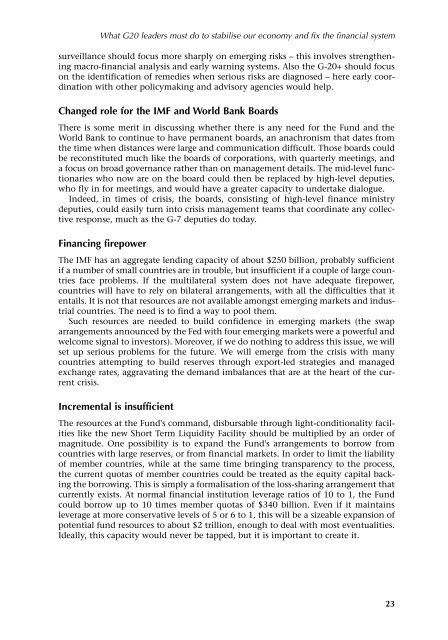What G20 Leaders Must Do To Stabilise our Economy and Fix ... - Vox
What G20 Leaders Must Do To Stabilise our Economy and Fix ... - Vox
What G20 Leaders Must Do To Stabilise our Economy and Fix ... - Vox
Create successful ePaper yourself
Turn your PDF publications into a flip-book with our unique Google optimized e-Paper software.
<strong>What</strong> <strong>G20</strong> leaders must do to stabilise <strong>our</strong> economy <strong>and</strong> fix the financial systemsurveillance should focus more sharply on emerging risks – this involves strengtheningmacro-financial analysis <strong>and</strong> early warning systems. Also the G-20+ should focuson the identification of remedies when serious risks are diagnosed – here early coordinationwith other policymaking <strong>and</strong> advisory agencies would help.Changed role for the IMF <strong>and</strong> World Bank BoardsThere is some merit in discussing whether there is any need for the Fund <strong>and</strong> theWorld Bank to continue to have permanent boards, an anachronism that dates fromthe time when distances were large <strong>and</strong> communication difficult. Those boards couldbe reconstituted much like the boards of corporations, with quarterly meetings, <strong>and</strong>a focus on broad governance rather than on management details. The mid-level functionarieswho now are on the board could then be replaced by high-level deputies,who fly in for meetings, <strong>and</strong> would have a greater capacity to undertake dialogue.Indeed, in times of crisis, the boards, consisting of high-level finance ministrydeputies, could easily turn into crisis management teams that coordinate any collectiveresponse, much as the G-7 deputies do today.Financing firepowerThe IMF has an aggregate lending capacity of about $250 billion, probably sufficientif a number of small countries are in trouble, but insufficient if a couple of large countriesface problems. If the multilateral system does not have adequate firepower,countries will have to rely on bilateral arrangements, with all the difficulties that itentails. It is not that res<strong>our</strong>ces are not available amongst emerging markets <strong>and</strong> industrialcountries. The need is to find a way to pool them.Such res<strong>our</strong>ces are needed to build confidence in emerging markets (the swaparrangements announced by the Fed with f<strong>our</strong> emerging markets were a powerful <strong>and</strong>welcome signal to investors). Moreover, if we do nothing to address this issue, we willset up serious problems for the future. We will emerge from the crisis with manycountries attempting to build reserves through export-led strategies <strong>and</strong> managedexchange rates, aggravating the dem<strong>and</strong> imbalances that are at the heart of the currentcrisis.Incremental is insufficientThe res<strong>our</strong>ces at the Fund's comm<strong>and</strong>, disbursable through light-conditionality facilitieslike the new Short Term Liquidity Facility should be multiplied by an order ofmagnitude. One possibility is to exp<strong>and</strong> the Fund's arrangements to borrow fromcountries with large reserves, or from financial markets. In order to limit the liabilityof member countries, while at the same time bringing transparency to the process,the current quotas of member countries could be treated as the equity capital backingthe borrowing. This is simply a formalisation of the loss-sharing arrangement thatcurrently exists. At normal financial institution leverage ratios of 10 to 1, the Fundcould borrow up to 10 times member quotas of $340 billion. Even if it maintainsleverage at more conservative levels of 5 or 6 to 1, this will be a sizeable expansion ofpotential fund res<strong>our</strong>ces to about $2 trillion, enough to deal with most eventualities.Ideally, this capacity would never be tapped, but it is important to create it.23














